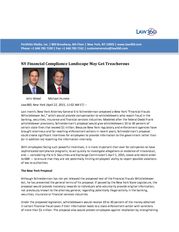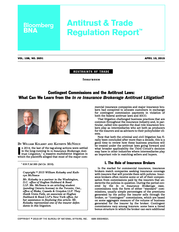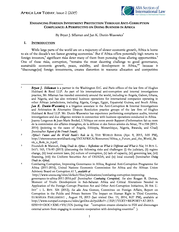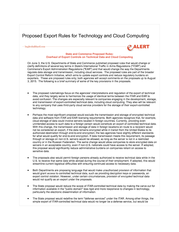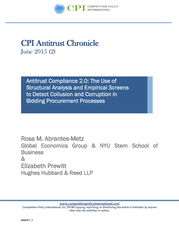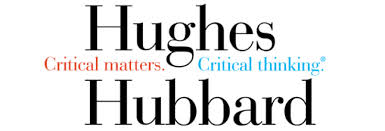Description
Regulatory & Compliance | Corruption in Brazil
over time, among other factors. Where
applicable, the fine must also be proportionate
to the contract secured or attempted by the
offending entity. On the other hand, the amount
must be reduced if the company cooperated with
the authorities (including by self-reporting) and
compensated damages and, most significantly,
if it had established and implemented an effective
compliance programme (as discussed below). In
any case, entities receiving monetary penalties
must publish this outcome in a newspaper of
general circulation and on their website, and
must also post it in plain sight at their offices.
â– Civil sanctions result from a lawsuit filed
i ndependent ly f rom t he a d m i n ist rat ive
proceed ing. Closely fol low ing the OECD
guidelines, they include: (i) disgorgement of
prof its and proceeds of the of fence;
(ii) suspension or revocation of the commercial
license; (iii) judicial winding-up order; and
(iv) debarment from participating in public
procu rement or f rom receiv i ng publ ic
benefits, funds, or aid.
Under the law, courts must resort to compulsory dissolution only in extreme circumstances, where an entity was recu r rently used to f u r ther or faci l itate misconduct or was incorporated as a front to conceal its ultimate beneficiaries. Effective compliance programmes: a roadmap Consistent with global anti-corruption standards, to be considered strong and ef fective an integrity programme should include the following elements: (i) an appropriate tone at the top; (ii) written standards of conduct, codes of ethics, integrity policies and procedures (as communicated to all directors, employees, and where required, third parties); (iii) periodic compliance training; (iv) periodic risk assessments and corresponding updates to the compliance programme; (v) accurate bookkeeping; (vi) strong financial controls; (vii) specific procedures to prevent fraud and other misconduct in connection with public tenders and any dealings with public authorities; (viii) an independent and st r uc t u re d c ompl ia nc e f u nc t ion ; (i x) a whistleblower mechanism open to employees and third parties, as well as whistleblower protection measures; (x) disciplinary measures for engaging in unethical conduct; (xi) mechanisms ensuring prompt discontinuation of misconduct and timely remediation of damages; (x ii) due diligence for third parties (including agents, ser v ice prov iders and business partners); (x i i i) ba ck g rou nd check s a nd e x posu re assessments prior to mergers, acquisitions and other restructuring activities; (xiv) continuous monitoring and improvement of the compliance programme; and (xv) transparency surrounding donations to political parties and campaigns. I n a sse ssi n g t he se c r it er ia , Bra z i l ia n enforcement authorities will be more or less strict, depending on the size and complexity of the investigated company or group, as well as the nature of their business activities. Ethical Boardroom | Summer 2015 Leniency agreement: the Brazilian plea bargain Mirroring the strategy of other enforcement agencies (such as the Department of Justice in the US or the Serious Fraud Office in the UK) the Brazilian system strongly encourages offending companies to cooperate with the authorities to resolve corruption charges. The difference here is that the law does not afford the possibility of a deferred prosecution agreement, only authorising a type of settlement that necessarily includes an admission of guilt: the ‘leniency agreement’. This Brazilian version of a plea bargain must be negotiated directly with the government authority in charge of the administrative proceedings. By cooperating, companies may be able to reduce the monetary f ine by up to two-thirds, as well as avoid debarment from public procurement or funding. However, by express prov ision, entities within the same group or family will only benefit from the deal to the extent that they all sign it and comply with its conditions. To qualify for a leniency agreement, besides pleading guilty, companies must immediately cease the misconduct, fully and continuously cooperate with the investigations and enforcement proceedings and provide information and documents that prove the offence and identify other wrongdoers. The authorities may also require corporations to implement or enhance their internal controls and compliance programme and impose any other conditions to ensure that the agreement is effective. The role of compliance: prevention pays These rules show that Brazil’s anti-corruption approach is heavily focused on deterrence, as they give clear incentives for businesses to invest in compliance and prevention.
In and of itself, the strict liability standard induces companies to raise their level of diligence and care in order to reduce bribery risks. Corporations are also specifically encouraged to detect and prevent violations, because repeating an offence or allowing it to continue over time will inevitably lead to larger fines. But even more directly, the law explicitly provides for lighter sanctions where a strong integrity programme is in place, instantly rewarding companies that make serious efforts to comply with the law. Notably, corporations should not wait for problems to arise before making essential a dju s t ment s , a s t hei r opt ion s a f t er a n enforcement action begins are not necessarily cost-effective.
Leniency agreements, for example, while potentially reducing the amount of fine, carry risks that must be weighed on a case-bycase basis by any company under investigation. In particular, they require an admission of guilt that may transcend the charges settled with the administrative authority and lead to further consequences in court, including significant civil sanctions against the company and criminal sanctions against its employees. On the other hand, adopting robust internal controls is a safer and more predictable way to reduce risks. If resources are limited, in light of Brazil’s business culture and newly improved legal framework, the following measures in particular should be prioritised: â– Risk assessment Companies should identify their main areas of risk under the new law (especially related to bribery, corruption and conflicts of interest) through a thorough review of their operations, including with respect to staff, third parties, joint ventures, and activities involving interaction with public officials â– Internal culture and controls As company personnel adapts to the new anti-corruption rules and enforcement reality, management should set the tone to ensure an internal culture of compliance. This includes adopting written policies that clearly prohibit violations, as well as investing in effective communications, training, and internal controls â– Third party due diligence Third party relationships are an area of high risk in many countries and Brazil is no exception, particularly considering the strict liability standard. Therefore, companies should implement a rigorous due diligence process and review historical relationships with agents and joint venture partners, including through a full background check and a careful assessment of any red flags related to the relationship (such as lack of commercial purpose, offshore payments, or unusually high fees) These actions may not provide a universal solution, but they can greatly strengthen a company’s integrity mechanisms and generally reduce liability exposure.
While adapting to Brazil’s enhanced compliance environment may be challenging and will require gradual changes, businesses should take this as an opportunity to proactively review and improve their controls. Considering the risks and costs at stake, it pays to prevent. Copyright © 2015 by Ethical Boardroom strictly reserved. No parts of this material may be reproduced in any form without the written permission of Ethical Boardroom .
Under the law, courts must resort to compulsory dissolution only in extreme circumstances, where an entity was recu r rently used to f u r ther or faci l itate misconduct or was incorporated as a front to conceal its ultimate beneficiaries. Effective compliance programmes: a roadmap Consistent with global anti-corruption standards, to be considered strong and ef fective an integrity programme should include the following elements: (i) an appropriate tone at the top; (ii) written standards of conduct, codes of ethics, integrity policies and procedures (as communicated to all directors, employees, and where required, third parties); (iii) periodic compliance training; (iv) periodic risk assessments and corresponding updates to the compliance programme; (v) accurate bookkeeping; (vi) strong financial controls; (vii) specific procedures to prevent fraud and other misconduct in connection with public tenders and any dealings with public authorities; (viii) an independent and st r uc t u re d c ompl ia nc e f u nc t ion ; (i x) a whistleblower mechanism open to employees and third parties, as well as whistleblower protection measures; (x) disciplinary measures for engaging in unethical conduct; (xi) mechanisms ensuring prompt discontinuation of misconduct and timely remediation of damages; (x ii) due diligence for third parties (including agents, ser v ice prov iders and business partners); (x i i i) ba ck g rou nd check s a nd e x posu re assessments prior to mergers, acquisitions and other restructuring activities; (xiv) continuous monitoring and improvement of the compliance programme; and (xv) transparency surrounding donations to political parties and campaigns. I n a sse ssi n g t he se c r it er ia , Bra z i l ia n enforcement authorities will be more or less strict, depending on the size and complexity of the investigated company or group, as well as the nature of their business activities. Ethical Boardroom | Summer 2015 Leniency agreement: the Brazilian plea bargain Mirroring the strategy of other enforcement agencies (such as the Department of Justice in the US or the Serious Fraud Office in the UK) the Brazilian system strongly encourages offending companies to cooperate with the authorities to resolve corruption charges. The difference here is that the law does not afford the possibility of a deferred prosecution agreement, only authorising a type of settlement that necessarily includes an admission of guilt: the ‘leniency agreement’. This Brazilian version of a plea bargain must be negotiated directly with the government authority in charge of the administrative proceedings. By cooperating, companies may be able to reduce the monetary f ine by up to two-thirds, as well as avoid debarment from public procurement or funding. However, by express prov ision, entities within the same group or family will only benefit from the deal to the extent that they all sign it and comply with its conditions. To qualify for a leniency agreement, besides pleading guilty, companies must immediately cease the misconduct, fully and continuously cooperate with the investigations and enforcement proceedings and provide information and documents that prove the offence and identify other wrongdoers. The authorities may also require corporations to implement or enhance their internal controls and compliance programme and impose any other conditions to ensure that the agreement is effective. The role of compliance: prevention pays These rules show that Brazil’s anti-corruption approach is heavily focused on deterrence, as they give clear incentives for businesses to invest in compliance and prevention.
In and of itself, the strict liability standard induces companies to raise their level of diligence and care in order to reduce bribery risks. Corporations are also specifically encouraged to detect and prevent violations, because repeating an offence or allowing it to continue over time will inevitably lead to larger fines. But even more directly, the law explicitly provides for lighter sanctions where a strong integrity programme is in place, instantly rewarding companies that make serious efforts to comply with the law. Notably, corporations should not wait for problems to arise before making essential a dju s t ment s , a s t hei r opt ion s a f t er a n enforcement action begins are not necessarily cost-effective.
Leniency agreements, for example, while potentially reducing the amount of fine, carry risks that must be weighed on a case-bycase basis by any company under investigation. In particular, they require an admission of guilt that may transcend the charges settled with the administrative authority and lead to further consequences in court, including significant civil sanctions against the company and criminal sanctions against its employees. On the other hand, adopting robust internal controls is a safer and more predictable way to reduce risks. If resources are limited, in light of Brazil’s business culture and newly improved legal framework, the following measures in particular should be prioritised: â– Risk assessment Companies should identify their main areas of risk under the new law (especially related to bribery, corruption and conflicts of interest) through a thorough review of their operations, including with respect to staff, third parties, joint ventures, and activities involving interaction with public officials â– Internal culture and controls As company personnel adapts to the new anti-corruption rules and enforcement reality, management should set the tone to ensure an internal culture of compliance. This includes adopting written policies that clearly prohibit violations, as well as investing in effective communications, training, and internal controls â– Third party due diligence Third party relationships are an area of high risk in many countries and Brazil is no exception, particularly considering the strict liability standard. Therefore, companies should implement a rigorous due diligence process and review historical relationships with agents and joint venture partners, including through a full background check and a careful assessment of any red flags related to the relationship (such as lack of commercial purpose, offshore payments, or unusually high fees) These actions may not provide a universal solution, but they can greatly strengthen a company’s integrity mechanisms and generally reduce liability exposure.
While adapting to Brazil’s enhanced compliance environment may be challenging and will require gradual changes, businesses should take this as an opportunity to proactively review and improve their controls. Considering the risks and costs at stake, it pays to prevent. Copyright © 2015 by Ethical Boardroom strictly reserved. No parts of this material may be reproduced in any form without the written permission of Ethical Boardroom .

